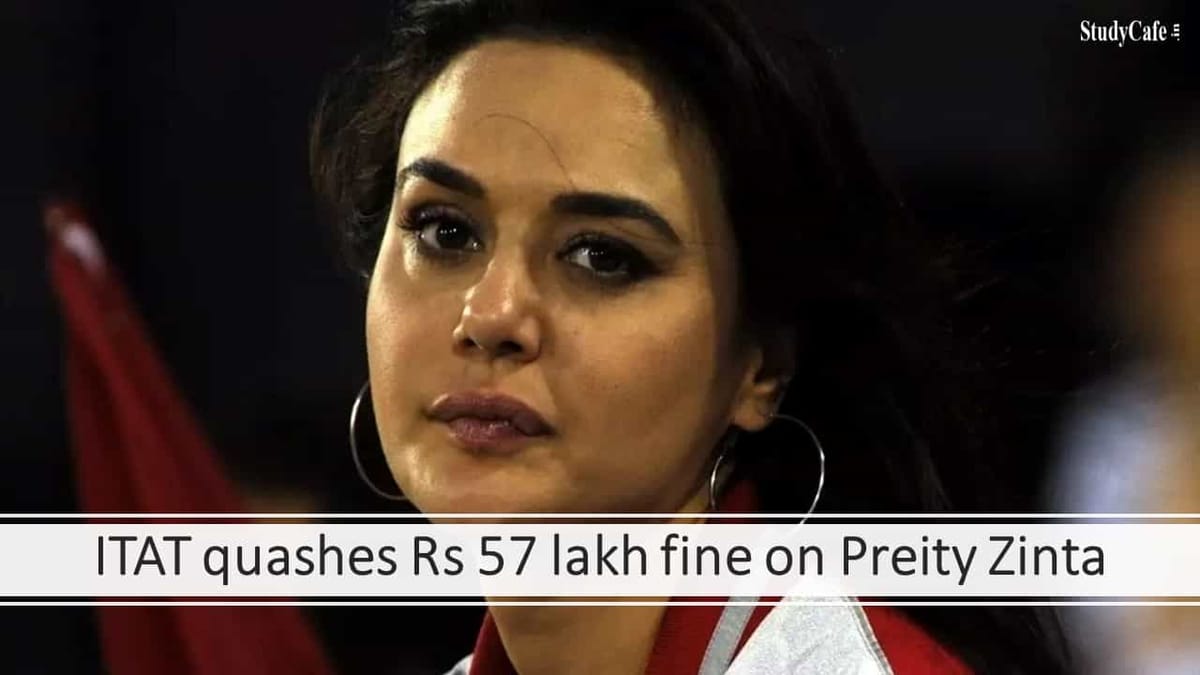CA Bimal Jain | Sep 13, 2021 |

ITAT quashes Rs 57 lakh fine on Preity Zinta
In MS. PREITY ZINTA v. DEPUTY COMMISSIONER OF INCOME TAX, MUMBAI [C.O. No. 98/Mum/2021 dated September 03, 2021], Ms. Preity Zinta (“Appellant”) filed cross objection against the order of learned Commissioner of Income Tax (Appeals) dated August 19, 2019 pertain to assessment year 2014-15.
In this case, the assessment under section 143(3) of Income Tax act was completed on 13.12.2016. The major disallowance was on account of interest of Rs. 1,72,70,635/-, which pertain to Financial Year (“F.Y.”) 2012-13 relevant to Assessment year (“A.Y.”) 2013-14 and not for the year under consideration i.e. A.Y. 2014-15. Penalty proceedings were initiated by issue of notice under section 271(1)(c) of Income Tax Act for furnishing inaccurate particulars of income. Order under section 271(1)(c) of the Income Tax Act levying penalty of Rs. 56,77,679/- was passed on 28.06.2017. The Assessing officer (“AO”) has mentioned that Ms. Preity Zinta (“assessee”) has claimed payment of bank interest for A.Y. 2014-15, however, there is no loan from the bank on the liability side. The submissions made by the assessee explaining the incurring of interest expenses on the loan taken for the movie “Ishque in Paris” , a project which was commenced during F.Y. 2011-12 and concluded in F.Y 2013-14. This fact was incorporated by AO in the assessment order. Regarding non-appearance of bank loan in the Balance Sheet, the submission of assessee is that this expenditure is mentioned in the statement of entire expenses submitted for this movie and that the entire loan was repaid by 31.03.2013 and therefore, there was no outstanding reflected in the Balance Sheet.
Moreover, Preity Zinta had claimed this interest as a business expenses deduction during the financial year 2013-14 this was denied by the I-T officer on pretext that it pertains to an earlier year. The officer then initiated penalty proceedings for furnishing of inaccurate particulars of income. Zinta contested this action by stating that the expenses were not bogus, there was no concealment of income and details of the project were declared in
the I-T return. She had also filed a copy of the term-loan letter from the bank. The commissioner (Appeals) passed an order in favour of the actress, but the Income Tax department filed an appeal with the Income Tax Appellate Tribunal.
Then, Preity Zinta filed cross objection on the ground that the Ld. Assessing Officer has failed to specify in the notice under section 274 of Income Tax Act read with Section 271(l)(c) of Income tax Act and the reasons for levy of penalty by mentioning “have concealed the particulars of income OR furnished inaccurate particulars of such income thereby being ambiguous on reasons/justification for levying penalty’’. This has resulted into violating the principle of natural justice by failing to give the Appellant a reasonable
opportunity of being heard.
The Income Tax Appellate Tribunal relied on the case of Principal Commissioner of Income-tax (Central) v. Goa Coastal Resorts and Recreation Pvt. Ltd. which held that the Notice which is issued to the assessee must indicate whether the Assessing Officer is satisfied that the case of the assessee involves concealment of particulars of income or furnishing of inaccurate particulars of income or both, with clarity. If the notice is issued in the printed form, then the necessary portions which are not applicable are required to be struck off, so as to indicate with clarity the nature of the satisfaction recorded. The Division Bench concluded that there was no proper record of satisfaction or proper application of mind in a matter of initiation of penalty proceedings.
The Income Tax Appellate Tribunal in the present case held that the notice in this case also is an omnibus show-cause notice as it does not strike off/delete the inappropriate/irrelevant/not applicable portion. Such a generic notice betrays a non- application of mind. Hence, the penalty levied pursuant to such a notice is not legally sustainable in law. Further, the Assessing Officer was bereft of valid jurisdiction as the notice issued to assessee is unsustainable in law. Hence, the penalty levied under section 271(1)(c) of Income Tax Act is liable to be deleted.
DISCLAIMER: The views expressed are strictly of the author and A2Z Taxcorp LLP. The contents of this article are solely for informational purpose and for the reader’s personal non-commercial use. It does not constitute professional advice or recommendation of firm. Neither the author nor firm and its affiliates accepts any liabilities for any loss or damage of any kind arising out of any information in this article nor for any actions taken in reliance thereon. Further, no portion of our article or newsletter should be used for any purpose(s) unless authorized in writing and we reserve a legal right for any infringement on usage of our article or newsletter without prior permission.
In case of any Doubt regarding Membership you can mail us at contact@studycafe.in
Join Studycafe's WhatsApp Group or Telegram Channel for Latest Updates on Government Job, Sarkari Naukri, Private Jobs, Income Tax, GST, Companies Act, Judgements and CA, CS, ICWA, and MUCH MORE!"